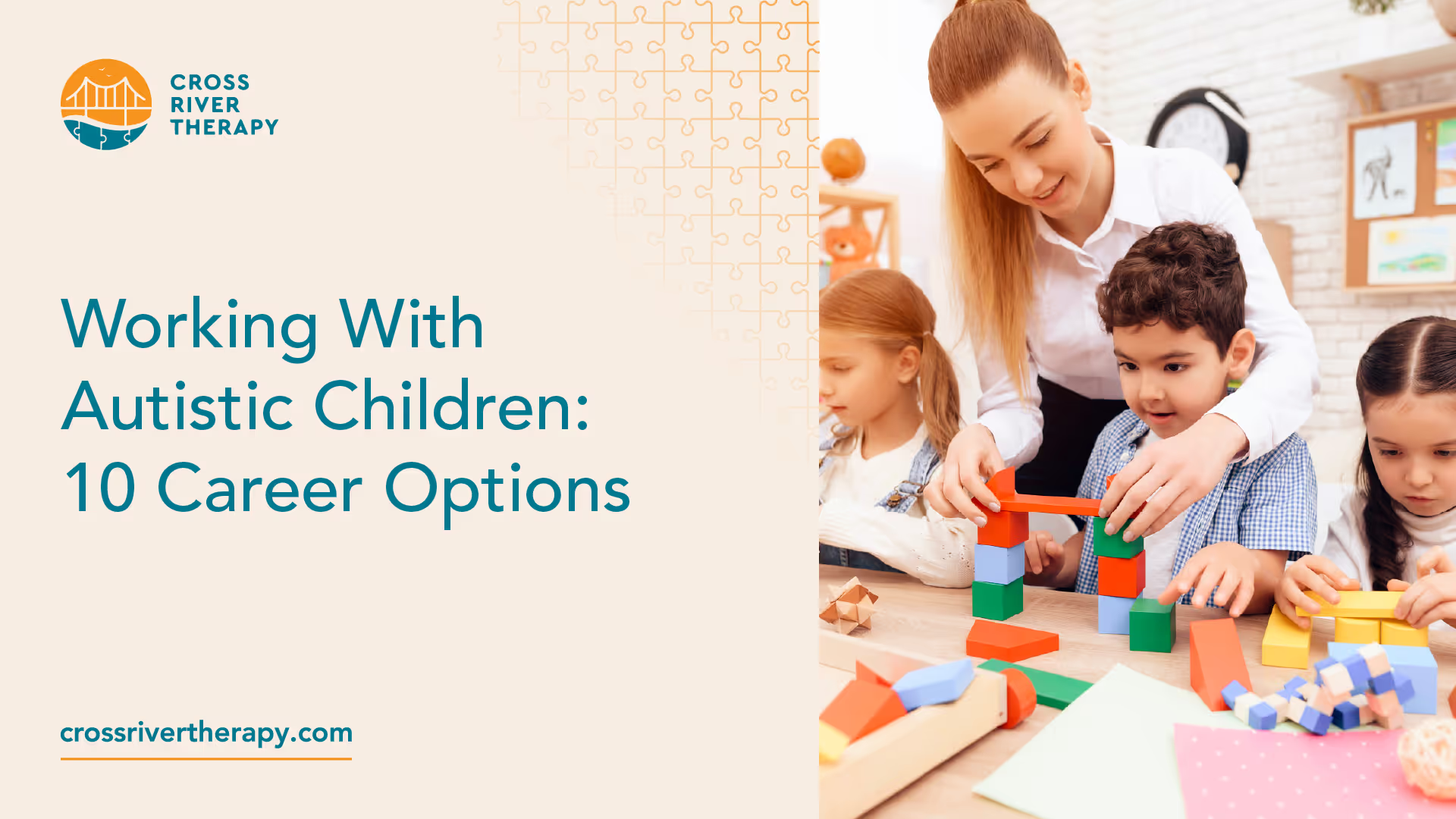Working With Autistic Children: 10 Career Options
Want to work with autistic children? Here are 10 career options for you to consider.

10 Career Options For Working With Autistic Children
We've listed 10 career options for people interested in working with autistic children.

1. Special Education Teacher
Known as some of the most qualified personnel to work in a school environment, a special education teacher possesses the knowledge to interact with different children, kids with autism included.
Through their education and certification credentials, they're in tune with the learning, physical, and behavioral issues that such young people face in a school setting.
For most special education teachers, days are spent mostly with kids, sometimes in classes that focus on one child at a time. Group sessions are also typical. Subjects can be broad but communication and literacy are very common.
2. ABA Therapist
Applied behavior analysts are people with experience in a particular area of psychology. This branch targets children with an autism diagnosis.
Within the field of ABA, they're usually called board-certified behavior analysts, abbreviated as BCBAs.
ABA therapists' duties are to understand a child's setting and link it to the behavior they put out to other people.
With this information, things that catalyze poor behavior are noted. After that, a plan is formulated to reduce the negative reactions. ABA therapists may work at an ABA center or hospital with an ABA program.
3. Autism Spectrum Disorder Specialist
An autism spectrum disorder specialist is almost the same as an ABA therapist. Both work with autistic patients and set out plans to help reduce unwanted behavior.
However, spectrum disorder specialists are almost entirely found in institutions of learning.
They work in classrooms, mostly as aids to special education teachers.
ABA therapists are often employed at a medical institution instead. In many schools, a Bachelor's is needed for a spectrum disorder specialist to be considered for employment. They must complete different tests and receive the proper certifications relevant to their profession.
4. Occupational Therapist
Working with many people in varied fields, occupational therapists help the autistic to become more self-reliant, giving them the necessary skills to make good choices on their own.
The skills they teach are highly beneficial, even when the patient has long left their therapy sessions.
Occupational therapists make note of people's interactions, also assisting people without autism but who suffer from very similar disorders.
They make the patients they see aware of different life skills. For this reason, they may work with autistic people diagnosed at a later age in life.
5. Social Worker
Social workers are essential to the health and well-being of communities throughout the country. There are many responsibilities needed to successfully be employed in this profession.
Autism patients are sometimes given time to social workers. In this time, the social worker will utilize their skills to better their mental health and welfare.
They can even improve patients' social and communicative issues.
Many social workers that spend hands-on time with the autistic will do so with their family members, such as parents.
Capable of setting up different services to help in areas where others can’t, social workers can serve as case managers for individual kids. Some are in close contact with school counselors.
6. Speech-Language Pathologist
A common symptom of autism is having a hard time using spoken language and getting points.
Speech-language pathologists can immensely help with this. SLPs will set up multiple plans to boost communication abilities. Some might not factor in speaking to people in a way that most are familiar with.
When these practices are implemented, they're called alternative and augmentative communication.
Examples are communication through photos, sign language, and even smartphones. SLPs can also reduce impediments in the speech of autistic patients, or others that aren't diagnosed with a disorder but still have problems talking clearly.
7. Rehabilitation Therapist
A rehabilitation therapist's duties are carried out in schools, community centers, and government facilities.
They review the limits and capabilities of patients, getting them to understand themselves better to help grow their relationships with their families and the people they see every day.
Much of their work revolves around giving their clients relief through their own independent choices.
But when it comes to children, they must gain a more in-depth understanding of their emotional status.
And kids with autism exhibit numerous emotions. Most rehabilitation therapists have Master's degrees earned through coursework involving the study of communication disorders or psychology.
8. Developmental Psychologist
A developmental psychologist may work in a hospital, ABA clinic, or school.
They have many children with ASD and can give recommendations to parents, school staff, and parents of treatment options.
Some also become important assessments when interventions are done.
They provide mechanisms for kids to cope with things that bother them. It can allow children to handle themselves better, either before, during, or after they receive additional ABA treatment.
Many study psychology and are qualified to work with people experiencing severe trauma or social anxieties.
9. Art Therapist
An art therapist uses intervention strategies with autistic kids that face problems with talking to people or with language in general.
With their help, a child can learn to articulate themselves better and with more confidence.
It's not limited to having children make artwork for this purpose.
Communication can incorporate dancing, music, and drama acting to achieve the patient's goals. Art therapists working with the autistic have Master's degrees in art, topped off with child psychology and special education coursework.
10. Nanny
Nannies are usually hired by parents. Autistic children require special care and attention, which may wear down parents and interfere with their work.
Nannies can fill in for them and even provide ABA for their child with the help of social workers or BCBAs.
Nannies looking out for autistic children can have additional duties that go beyond that of a typical nanny for an undiagnosed child.
Many requirements for being a nanny change from place to place. Many in the care of children with disorders will have certification of some sort, either in special education or psychology.
5 Tips For Working With Autistic Children
Now that you have seen several career options that allow you to work with autistic children, we'll give you a few tips to keep in mind.

1. Understand how it's easiest for them to learn
Autistic kids often think in visual terms and take in knowledge the same way. Pictures are perfect for this since they form a visual aid for teachers to rely on when attempting to improve their language abilities.
They're also beneficial in helping them understand numbers and the recognition of different words.
Still, this may not be of use with every child in session. Every patient must be thoroughly assessed so that a plan that works is formulated from the beginning.
2. Move around during therapy sessions
Autistic kids have significant and mild symptoms. Those in the latter category may not have issues learning in a classroom environment with other kids.
One thing that all have in common is the intake of knowledge through movement.
Kids like visual and physical activity for themselves, their peers, and teachers when learning new subjects. I may also help mitigate a child's social impairments.
3. Set up a quiet space for them
Things like loud sounds, bright lights, and classroom chatter can be very distracting for anyone. But for a patient with autism, it may trigger an emotional response.
To reduce the likelihood of this, workers can set up a quiet place for them to settle down when things around them become too much for them to handle.
Parents can also set up similar areas for their children at home. A small tent or boxed clubhouse are two ideas, something with just enough space for them to compose themselves. Headphones are good for this as well.
4. Increase the percentage cap for successful goals
Goals should be expected when working with autistic kids, but there will be days when they're not up to speed. This can happen to anyone, including adults with no disorders.
Therapists are anyone working with autistic patients shouldn't push them too hard when they're having a day with an unusual lack of attentiveness.
5. Don't make things too simple
If a child gives visual or physical clues showing that they want a toy, snack, or other items, the people conducting therapy should avoid reducing the difficulty in obtaining it.
By allowing the child to verbally ask for it instead of the thing being handed to them, improvement can be made in their social skills.
References
Recent News
Related articles

Working With Autistic Children: 10 Career Options
Want to work with autistic children? Here are 10 career options for you to consider.

What Is The Age Limit For ABA Therapy In Indiana?
Find out what the age limit is for receiving Applied Behavior Analysis (ABA) therapy in Indiana.

What Is The Age Limit For ABA Therapy In Arizona?
Find out what the age limit is for receiving Applied Behavior Analysis (ABA) therapy in Arizona.

Verbal Operants In ABA: Definition & Examples
In Applied Behavior Analysis, verbal operants are a type of verbal behavior.

Token Economy: Examples & Applications in ABA
A token economy is a procedure that was developed to help reduce maladaptive behaviors and increased desire behaviors by providing a tangible conditioned reinforcer.

Trigger Analysis In ABA: Definition & Examples
Trigger analysis is a segment of ABA therapy where children are taught by therapists to pinpoint the behaviors and emotions that happen before, during, and after an event that takes place.

Variable Ratio Schedule & Examples
A variable-ratio schedule is a random reinforcement where responses are reinforced following varied responses afterward.

Task Analysis In ABA Therapy: Examples & Strategies
Task analysis is a process of teaching that divides complicated activities into sections involving easier steps for students to more easily take.

Stimulus Equivalence In ABA: Definition & Examples
Stimulus equivalence shows how relationships can manifest among different types of stimuli in different situations.

Speech Therapy For Autism: ABA vs. Speech Therapy
ABA therapy can help individuals with speech impairments learn to better identify and utilize the language skills they already have.

Stimulus Control Transfer ABA: Definition & Examples
Stimulus control is defined as an expression used to detail circumstances where a behavior is triggered by the existence or absence of a stimulus.

Social Validity In ABA: Definition & Examples
Social validity is the acceptance of interventions concerning behavioral changes.

